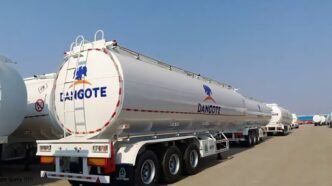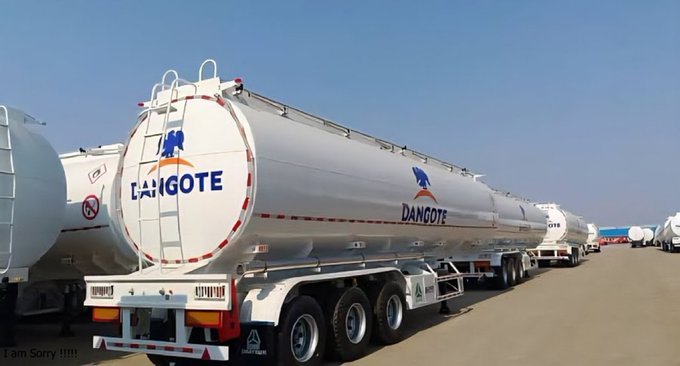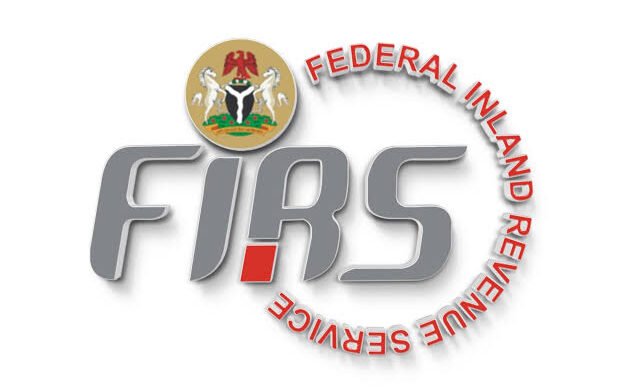Lagos, Nigeria — Oil marketers across Nigeria have called on the Dangote Petroleum Refinery to embrace a more inclusive and collaborative distribution framework as the company unveiled a fleet of Compressed Natural Gas (CNG)-powered delivery trucks. While the development has been widely welcomed as a step toward cleaner energy and efficient logistics, stakeholders insist that the new fleet alone is insufficient to guarantee a sustainable, nationwide supply of refined products.
The appeal comes at a time when the refinery, Africa’s largest single-train facility, is positioning itself as a game-changer in Nigeria’s downstream oil sector. With an installed refining capacity of 650,000 barrels per day, the Dangote Refinery is projected to significantly reduce the nation’s dependence on imported petroleum products. However, industry experts warn that refining output alone does not guarantee energy accessibility; distribution bottlenecks remain one of the greatest challenges in Nigeria’s petroleum supply chain.
Marketers Laud Innovation But Warn of Gaps
The announcement of CNG-powered delivery trucks by Dangote Industries has drawn applause from energy analysts and environmental advocates alike. CNG vehicles are considered cleaner, cost-effective alternatives to traditional diesel trucks, aligning with global commitments to cut emissions.
However, the Independent Petroleum Marketers Association of Nigeria (IPMAN) and other players in the downstream sector argue that without inclusive participation, the refinery risks creating a distribution model that may not fully address Nigeria’s diverse logistics challenges.
“Dangote Refinery has done well to invest in CNG-powered trucks, which will certainly reduce operating costs and environmental pollution,” said one marketer in Lagos. “But the reality is that no single company can handle nationwide distribution in a country as vast and complex as Nigeria. Collaboration with independent marketers is the only way to ensure products reach every nook and cranny of the country.”
The Distribution Challenge
Nigeria’s petroleum distribution network is riddled with inefficiencies ranging from poor road infrastructure to inadequate storage facilities in certain regions. While major cities such as Lagos, Abuja, and Port Harcourt are relatively easier to access, smaller towns and rural communities often experience supply disruptions due to logistical constraints.
Marketers insist that the Dangote Refinery, regardless of its production efficiency, will need a wide network of third-party distributors to achieve national penetration.
“Refining is only one part of the puzzle,” explained an energy analyst. “Getting the product to the last mile is a different challenge altogether. Independent marketers already have an established network of filling stations across the country. Leveraging this network is key to success.”
According to industry estimates, independent marketers control nearly 80% of filling stations nationwide, while major marketers operate largely in urban centers. This dominance underscores why collaboration with marketers will be critical if Dangote Refinery is to fulfill its promise of ending fuel scarcity and stabilizing prices.
Why CNG Trucks Alone May Not Be Enough
The rollout of CNG-powered trucks is being celebrated as an innovative leap, but analysts caution against over-reliance on the fleet as the sole distribution mechanism. For one, the trucks are unlikely to be sufficient in number to cover Nigeria’s vast geographical landscape in the short term.
“Dangote’s trucks will certainly serve as a model, but we must be realistic,” said another marketer in Kano. “Even if the company deploys thousands of trucks, Nigeria is too big for a centralized distribution system. There must be room for private tanker operators, regional depots, and existing petroleum marketers.”
In addition, the success of CNG trucks is contingent on the availability of CNG refueling stations across the country. At present, Nigeria has only a limited number of such stations, mostly concentrated in Lagos and a handful of major cities. This means that without a rapid expansion of CNG infrastructure, the trucks may face operational limitations.
Calls for Inclusive Supply Agreements
Stakeholders are now urging Dangote Refinery to sign inclusive supply agreements with independent marketers, ensuring that petroleum products are accessible nationwide.
IPMAN, the Depot and Petroleum Products Marketers Association of Nigeria (DAPPMAN), and the Major Oil Marketers Association of Nigeria (MOMAN) have all expressed readiness to partner with Dangote Refinery in distributing products such as petrol, diesel, kerosene, and aviation fuel.
A joint statement from some marketer groups emphasized the importance of inclusivity:
“Dangote Refinery’s success is Nigeria’s success. We welcome the innovation of CNG-powered trucks, but the distribution framework must be inclusive. Independent marketers represent the link between producers and end-users, particularly in rural communities where fuel access remains a challenge.”
The Role of Government
The Nigerian government also has a critical role to play in shaping the refinery’s distribution strategy. Industry regulators such as the Nigerian Midstream and Downstream Petroleum Regulatory Authority (NMDPRA) are expected to ensure fair access to products, preventing monopolistic practices that could undermine market competition.
Government intervention will also be necessary in expanding road infrastructure and investing in CNG refueling stations, both of which are essential for the smooth operation of the new truck fleet.
“Energy security is not just about refining capacity,” said a policy expert in Abuja. “It is about building an ecosystem that ensures availability, affordability, and accessibility. The government must support Dangote’s efforts while protecting the interests of independent marketers and consumers.”
Potential Benefits of Inclusive Distribution
If Dangote Refinery adopts an inclusive distribution approach, analysts predict several benefits:
- Nationwide Access – Partnering with existing marketers will ensure that products reach remote areas, reducing the perennial problem of fuel scarcity in rural communities.
- Job Creation – Collaboration with marketers and tanker operators will sustain jobs across the downstream sector, preventing displacement of thousands of workers.
- Price Stability – A wider distribution network can help reduce arbitrage and sharp practices by ensuring that fuel is available in more locations, reducing the chances of hoarding.
- Faster Market Integration – By tapping into existing storage depots and filling stations, the refinery can quickly integrate into Nigeria’s supply chain rather than building an entirely new network from scratch.
Looking Beyond Nigeria
Beyond the domestic market, the Dangote Refinery also has ambitions to supply refined products to neighboring countries in West and Central Africa. Industry players note that inclusive partnerships at home will strengthen the refinery’s ability to expand abroad.
Regional exports will require complex logistics, including cross-border trucking and port-based shipments. Analysts believe that working closely with Nigerian marketers will provide valuable experience in building an efficient distribution model that can be replicated in regional markets.
Environmental and Economic Implications
The introduction of CNG-powered trucks signals a broader shift toward cleaner energy solutions in Nigeria’s oil and gas sector. By reducing reliance on diesel trucks, the Dangote Refinery is also helping to cut carbon emissions, aligning with Nigeria’s commitment to achieve net-zero emissions by 2060.
Economically, CNG offers a cheaper alternative to diesel, potentially lowering transportation costs and stabilizing pump prices for consumers. However, the long-term viability of this model depends on government policies that incentivize investment in natural gas infrastructure.
Conclusion
The Dangote Refinery’s rollout of CNG-powered delivery trucks is a welcome development, showcasing innovation, environmental consciousness, and a commitment to efficient logistics. Yet, as oil marketers rightly point out, the refinery cannot achieve nationwide fuel supply alone.
Nigeria’s vast geography, coupled with infrastructure challenges, demands a collaborative approach that leverages the existing networks of independent marketers and depot owners. Only through an inclusive distribution model can the refinery deliver on its promise of transforming Nigeria’s petroleum landscape.
For now, the message from industry stakeholders is clear: Dangote Refinery must open its doors to partnerships if it is to secure its place not just as Africa’s largest refinery, but also as the backbone of Nigeria’s energy accessibility.














